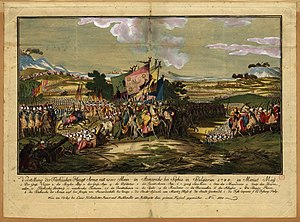Austro–Turkish War (1787–1791)
| Austro-Turkish War (1788-91) | |||||||
|---|---|---|---|---|---|---|---|
| Part of the Ottoman–Habsburg wars | |||||||
 The main Ottoman army led by the Grand Vizier advancing to Sofia in May 1788. |
|||||||
|
|||||||
| Belligerents | |||||||
|
|
|
||||||
| Commanders and leaders | |||||||
|
|
|
||||||
Inconclusive
The Habsburg-Ottoman War, Austro-Ottoman War or Austro-Turkish War, was fought in 1788–91 between the Habsburg Monarchy (Austria) and the Ottoman Empire, concurrently with the Russo-Turkish War (1787–92).
The war began as a Russian-Turkish conflict. The Russian Empire, headed by Catherine the Great, had been involved in previous wars of aggression and conquest against the Ottomans, and the two nations were openly hostile. In August 1787, after "numerous Russian provocations" (Hochedlinger), the Ottoman Empire declared war on the Russians. The Austrian Emperor Joseph II had concluded an alliance with the Russians in 1781, which (Hochedlinger) "obliged [him] to assist the Russians with his full might ... Vienna felt that it had to act promptly so as not to annoy the [Empress]. What Joseph had to make sure this time was that Austria did not come away empty-handed again, as over the Crimea in 1783–84."
In fact, Joseph was facing a serious threat to his rule in a distant portion of his empire, in what is now Belgium; as well as long-term tensions with a powerful northerly neighbor, Prussia. Hochedlinger opines that "war could not have come at a more inopportune moment."
Hochedlinger also judges the Turks also made a mistake in starting the war themselves. From the Russian point of view, "the conflict could now be presented to the European public as a defensive war against an aggressor. Turkish aggression also made it much more difficult for France to continue its traditional role as the Sultan's protector against Russian rapacity".
The Austrians entered the war in February 1788, though they had by now lost their best chance for an easy victory. The slow preparations of Russia resulted in the Ottoman concentration on Belgrade. The Austrians relied on Russian support in Moldavia, which only began in late 1788, and Joseph II seemed to have been reluctant to fight the Ottomans. In July, the Ottomans crossed the Danube and broke into the Austrian Banat. Shortage of supplies struck both sides, while disease struck the Austrian soldiers. As many as 50,000 Serb refugees flooded across the Danube, causing logistical problems for the Austrians. In mid-August, Joseph II dispatched 20,400 soldiers into the Banat. A Serbian Free Corps of 5,000 soldiers had been established in the Banat, composed of refugees that had fled earlier conflicts in the Ottoman Empire. The Corps would fight for liberation of Serbia and unification under Habsburg rule.
...
Wikipedia
